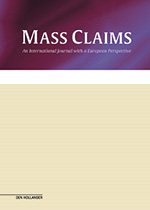R (on the application of PACCAR Inc) v Competition Appeal Tribunal
Anna Dannreuther and Gareth Shires1Case note: 2023 UKSC 28
On 26 July 2023, the UK Supreme Court ("UKSC") handed down its judgment in R (on the application of PACCAR Inc) v Competition Appeal Tribunal ("Paccar"). The case concerned litigation funding agreements ("LFAs") pursuant to which the funder was entitled to a percentage of any damages obtained. The issue was whether these constituted 'damages-based agreements' ("DBAs") and therefore had to comply with formal requirements set out in the Damages-Based Agreements Regulations 2013 ("DBA Regulations"). It was common ground in the case that the LFAs did not comply with such formal requirements and, as such, would be rendered unenforceable if the UKSC found they needed to so comply.
The UKSC held that such LFAs were indeed DBAs. The main consequences of this were twofold: (i) every single such LFA i...
U heeft op dit moment geen toegang tot de volledige inhoud van dit product. U kunt alleen de inleiding en hoofdstukindeling lezen.
Wanneer u volledige toegang wenst tot alle informatie kunt u zich abonneren of inloggen als abonnee.


